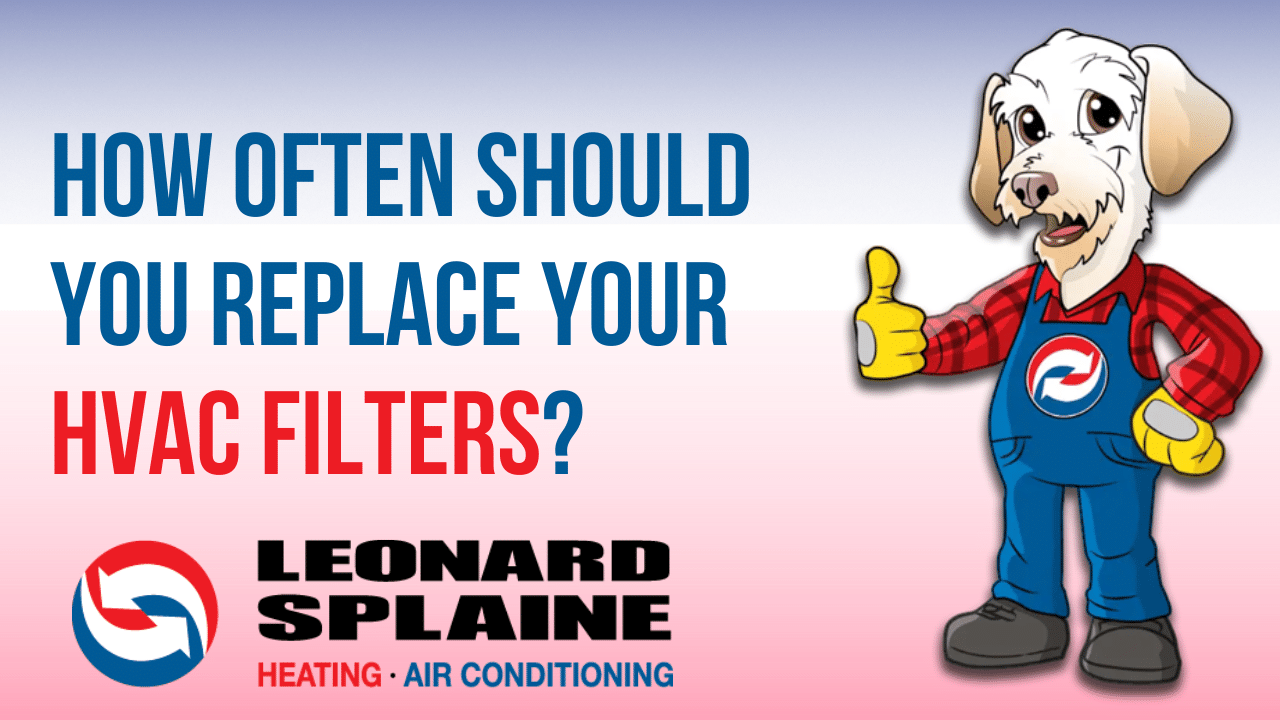Leonard Splaine How Often You Should Replace Your HVAC Filters

As an HVAC repair company serving Northern VA, one of the most common questions we receive from homeowners is, “How often should I replace my HVAC filters?” The frequency of changing your HVAC filters depends on several factors, including the type of filter, the environment in your home, and how often you use your HVAC system. In this blog post, we’ll delve into these factors and provide you with practical guidelines to ensure your HVAC system operates efficiently and effectively.
Understanding the Role of HVAC Filters
Before we discuss the frequency of filter replacement, it’s important to understand the role of HVAC filters. These filters are designed to trap dust, dirt, pollen, pet dander, and other airborne particles, preventing them from entering your HVAC system and circulating throughout your home. By doing so, they help improve indoor air quality, protect your HVAC system from damage, and maintain efficient operation.
Factors Influencing Filter Replacement Frequency
- Type of Filter
HVAC filters come in various types, each with a different lifespan. The most common types include:
- Fiberglass Filters: These are the most affordable and have a lifespan of about 30 days.
- Pleated Filters: These filters are more efficient at trapping particles and can last up to 90 days.
- High-Efficiency Particulate Air (HEPA) Filters: These are the most efficient filters, capable of capturing the smallest particles. Depending on the brand and usage, they can last between 6 to 12 months.
- Household Environment
The environment inside your home significantly impacts how often you should replace your HVAC filters. Consider the following factors:
- Pets: Homes with pets tend to accumulate more hair and dander, which can clog filters more quickly. If you have pets, you may need to replace your filters more frequently.
- Allergies or Respiratory Conditions: If someone in your household suffers from allergies or respiratory conditions, you’ll want to ensure your filters are always clean to maintain the best air quality. In such cases, replacing filters every 30-60 days is advisable.
- Smoking: Tobacco smoke can quickly clog filters, so if someone smokes inside your home, you should replace the filters more often.
- Usage of HVAC System
The more you use your HVAC system, the more often you’ll need to replace the filters. During peak seasons, such as winter and summer, when your HVAC system is running continuously, filters will become dirty faster and should be replaced more frequently.
General Guidelines for Filter Replacement
While the specific needs of your home may vary, here are some general guidelines for replacing HVAC filters:
- Every 30 Days: For homes with multiple pets, smokers, or individuals with severe allergies or respiratory conditions.
- Every 60 Days: For average homes with one pet or a couple of occupants.
- Every 90 Days: For homes with few occupants, no pets, and a relatively clean environment.
- Every 6-12 Months: For HEPA filters, depending on usage and manufacturer recommendations.
Signs That Your Filter Needs Replacement
Even if you follow the general guidelines, it’s important to be aware of the signs that your filter needs replacement. Here are some indicators:
- Visible Dirt and Dust: If you can see a significant amount of dirt and dust on the filter, it’s time to replace it.
- Increased Allergy Symptoms: If you or your family members are experiencing more allergy symptoms than usual, a dirty filter could be the cause.
- Higher Energy Bills: A clogged filter forces your HVAC system to work harder, leading to increased energy consumption and higher bills.
- Reduced Airflow: If you notice a decrease in airflow from your vents, it could be due to a dirty filter restricting the flow.
The Importance of Regular Filter Replacement
Regularly replacing your HVAC filters is crucial for several reasons:
- Energy Efficiency: A clean filter ensures that your HVAC system operates efficiently, reducing energy consumption and lowering your utility bills.
- System Longevity: By preventing dust and debris from entering your HVAC system, clean filters help extend the lifespan of your equipment.
- Indoor Air Quality: Clean filters improve the air quality in your home by trapping allergens and pollutants, creating a healthier living environment.
In conclusion, the frequency of replacing your HVAC filters depends on several factors, including the type of filter, your household environment, and how often you use your system. By following the general guidelines and paying attention to signs that your filter needs replacement, you can ensure that your HVAC system operates efficiently and provides clean, healthy air for your home.
At Leonard Splaine, we recommend setting a reminder to check your filters regularly and replace them as needed. If you have any questions or need assistance with your HVAC system, feel free to contact us. We’re here to help you maintain a comfortable and healthy home all year round.
Best HVAC repair company in Northern VA
Is your HVAC system not performing at its best? Schedule an appointment with Leonard Splaine today for expert HVAC repair services. Call us at 703-494-2855 to restore comfort and efficiency to your home. Don’t wait – ensure your HVAC system is in top shape with Leonard Splaine’s trusted repair services!
